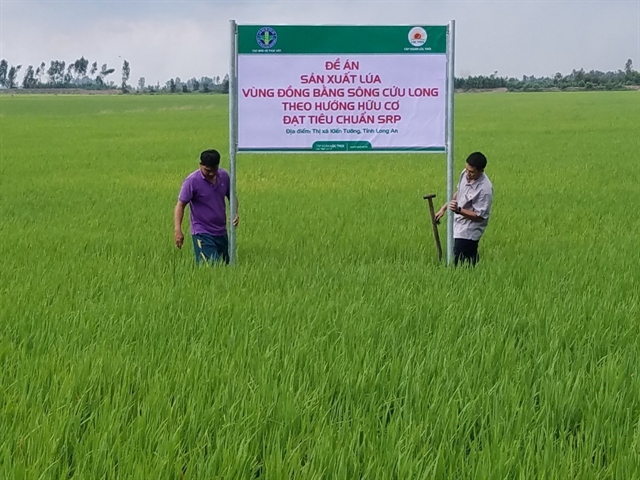Nearly 13,000ha of rice fields in the Cuu Long ( Mekong) Delta provinces will benefit from a project to foster organic farming that will involve the use of organic fertilisers.

Nearly 13,000ha of rice fields in the Cuu Long ( Mekong) Delta provinces will benefit from a project to foster organic farming that will involve the use of organic fertilisers.
An agreement to undertake the project was signed yesterday (July 30) by the Plant Protection Department with the Loc Troi Group based in Tay Ninh Province.
The project, to be carried out in 2019-21, is expected to cost around VND355.7 billion (US$15.3 million).
Organic fertilisers are mainly made from natural materials such as peat and sugarcane bagasse.
Hoang Trung, head of the department, said the project could help achieve the ministry's goal of producing three million tones of organic fertilisers annually by 2020.
“The use of organic fertilisers can boost the development of clean and organic farming in the country.”
The project will first be trialled on 100ha in An Giang, Dong Thap and Long An provinces before being expanded to 12,800ha in An Giang, Bac Lieu, Dong Thap, and Long An provinces.
The department and the company will use organic fertilisers to develop rice production models based on sustainable rice platform (SRP) standards.
The project will enable farmers to access measures to change from chemical-based to organic agriculture.
Huynh Van Thon, chairman and general director of Loc Troi, said the project comes amid the increasing global demand for sustainable agriculture and quality organic products.
“The important factors in the project achieving success are looking having markets for organic produce, local farmers’ awareness and linkages between Government, agribusiness companies and farmers.”
Farming using chemical fertilisers, pesticides and other products has succeeded in increasing the country’s production of food crops, fruits and commercial crops but caused severe ecological imbalances, making the land less fertile and increasing soil-borne pathogens. — VNS





